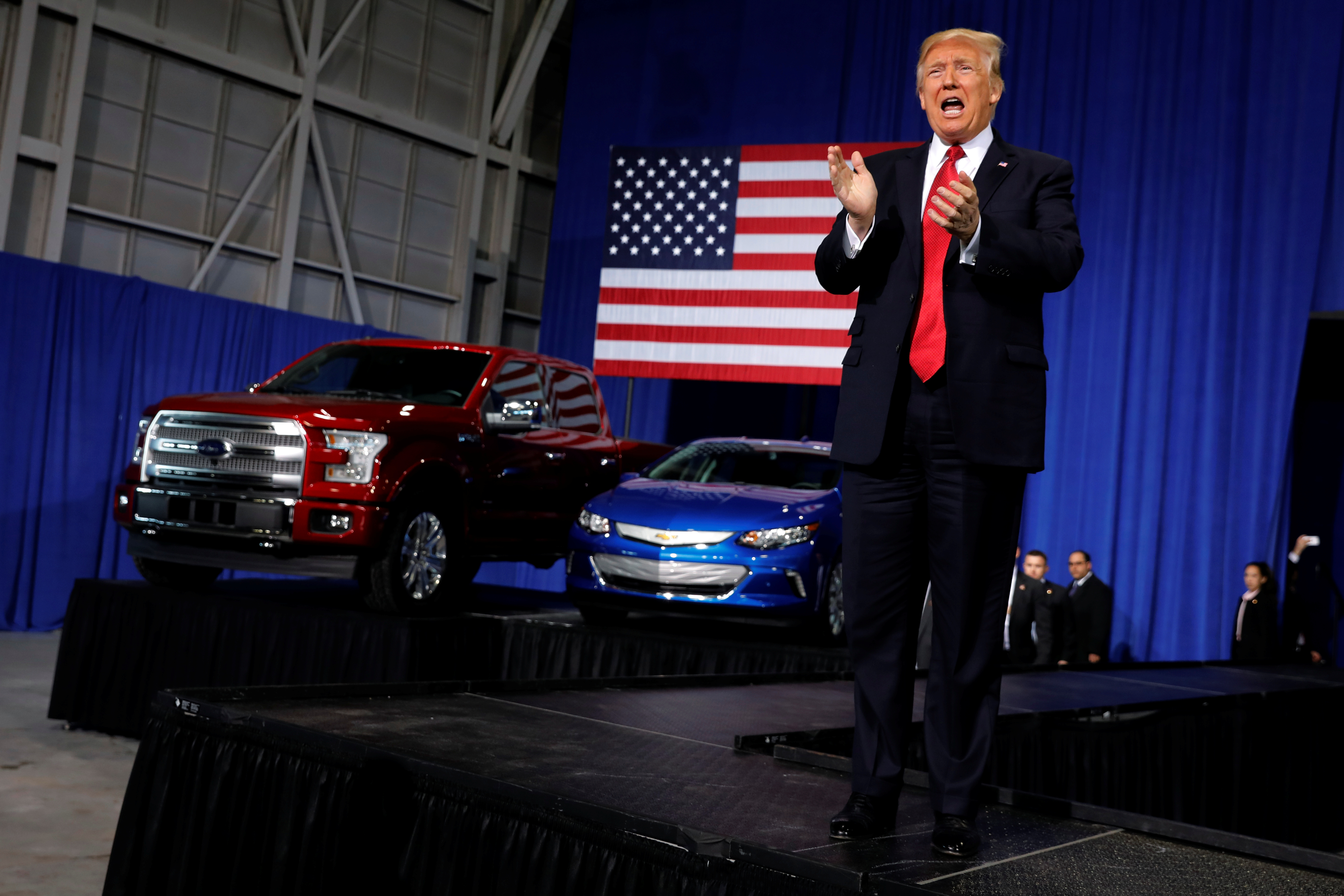How Trump launched the biggest regulatory rollback in American history
Experts say he's the most aggressively anti-regulation president ever

A free daily email with the biggest news stories of the day – and the best features from TheWeek.com
You are now subscribed
Your newsletter sign-up was successful
President Trump has embarked on the most aggressive regulatory rollback in history. Here's everything you need to know:
What's the goal?
President Trump declared war on the "regulation industry" on his first day in office, arguing it was "choking" economic growth. He immediately signed a "two-for-one" executive order requiring federal agencies to identify two regulations to eliminate for each new rule they want to impose, and with the help of the Republican-led Congress, he has killed or delayed more than 860 federal rules and regulations affecting almost all facets of everyday life — from environmental regulations banning coal plants from dumping waste into public waterways to mattress flammability standards and meat- and poultry-processing guidelines. "There's never been a president — and I am including President Reagan — who has been harsher, and more aggressive," says Rena Steinzor, professor at the University of Maryland Francis King Carey School of Law.
The Week
Escape your echo chamber. Get the facts behind the news, plus analysis from multiple perspectives.

Sign up for The Week's Free Newsletters
From our morning news briefing to a weekly Good News Newsletter, get the best of The Week delivered directly to your inbox.
From our morning news briefing to a weekly Good News Newsletter, get the best of The Week delivered directly to your inbox.
Which agency is leading the way?
The Environmental Protection Agency, headed by former Oklahoma Attorney General Scott Pruitt. A climate change skeptic, Pruitt sued the EPA 14 times as attorney general — nearly always in partnership with the oil and gas industry. As EPA head, Pruitt is gutting former President Barack Obama's environmental legacy, moving to rescind the Clean Power Plan and undo limits on greenhouse gas emissions from existing power plants, as well as lifting the ban on offshore drilling in the Arctic, Pacific, and Atlantic oceans. Pruitt is also targeting basic anti-pollution guidelines. He outraged environmentalists and public health scientists by scrapping a rule prohibiting power plants from dumping toxic pollutants — including arsenic, lead, mercury, and cadmium — into public streams, rivers, and lakes. In addition, the EPA has rescinded a proposed ban on the widespread use of the pesticide chlorpyrifos on crops, despite evidence it can damage children's neurological development.
What about other agencies?
The Interior Department has rolled back a ban on coal mining on public lands, and recommended that Trump use an executive order to shrink at least three national monuments in Utah and Oregon to open up hundreds of thousands of acres to mining and drilling. The Labor Department has postponed a rule that would have minimized construction workers' exposure to carcinogenic silica dust, while Betsy DeVos' Education Department wants to eliminate more than a half dozen Obama-era measures designed to protect students from for-profit colleges' predatory loan practices.
A free daily email with the biggest news stories of the day – and the best features from TheWeek.com
What about banking?
Wall Street will also enjoy the fruits of the Trump administration's anti-regulation fervor. The Treasury Department, headed by former Goldman Sachs executive Steven Mnuchin, has already targeted nearly 90 banking and financial regulations for reassessment or repeal. The changes would lift the gross profit of the six largest U.S. banks by $27 billion. Many of the targeted rules were passed in the wake of the 2008 financial crisis to rein in the kind of risky banking activities that led to the meltdown. The implementation of the fiduciary rule, which would have required financial advisers to act in the consumer's best interest, rather than recommending investments that they're paid to push, has also been delayed by 18 months. The overall effect of this rollback, argues regulatory policy advocate Amit Narang, is to leave Americans vulnerable "on a daily basis" — to "unsafe products and tainted food, dangerous workplaces, and a newly deregulated Wall Street that once again could threaten economic collapse."
What is Trump's rationale?
He believes deregulation is key to achieving his campaign promise of providing at least 3 percent annual economic growth. Trump and other Republicans argue the number of government regulations grew out of control under Obama. The printed version of the Federal Register, which records government regulations, hit 97,110 pages under Obama's watch, surpassing the previous record of 81,405, and the conservative think tank American Action Forum estimated that Obama-era regulations imposed a "cumulative burden" of $890 billion on businesses. "It's not as if there aren't an enormous number of regulations still on the books," says Marc Short, Trump's legislative affairs director. "I think it would be unfair to paint it as if you are moving into an anarchical society."
What do businesses think of deregulation?
They love it. The Dow and S&P 500 are up more than 8 percent so far in 2017, while 80 percent of the members of the National Association of Manufacturers say they support Trump's deregulation campaign. Many constituents in states where oil and gas drilling are being freed from environmental rules are also happy, believing that deregulation will lead to more jobs and higher wages. But Politico recently reported that many oil and gas industry officials worry about the aggressive pace and reach of Trump's regulatory rollback. If there's an environmental catastrophe, like a major oil spill or water-supply poisoning, said Brian Youngberg, an energy analyst at the investment firm Edward Jones, it would create a powerful backlash against deregulation and the energy industry. "You don't need to roll things back so far that it opens an opportunity for outsiders to criticize, or something bad happens," Youngberg said.
Foxes guarding henhouses
During his campaign, Trump promised to "drain the swamp" of special interest groups. Yet one of his first actions as president was to remove an Obama-era ethics restriction banning lobbyists from joining government agencies they had lobbied in the past two years. Trump has since hired more than 100 lobbyists from Big Pharma, health care, and the energy and finance industries — roughly two thirds of whom work in departments they once directly lobbied, according to American Bridge 21st Century, a liberal advocacy group. One lobbyist turned regulator is Michael Cantanzaro, a former representative of natural gas producer Devon Energy. Cantanzaro lobbied against a specific EPA rule limiting methane emissions from oil- and gas-drilling sites; one of his first actions in government was to help write an executive order instructing federal agencies to terminate that methane rule. "It's happening across the federal government," says Eric Lipton, a New York Times reporter who covers the Trump administration. "The regulated have become the regulators."
-
 What to watch out for at the Winter Olympics
What to watch out for at the Winter OlympicsThe Explainer Family dynasties, Ice agents and unlikely heroes are expected at the tournament
-
 Properties of the week: houses near spectacular coastal walks
Properties of the week: houses near spectacular coastal walksThe Week Recommends Featuring homes in Cornwall, Devon and Northumberland
-
 Will Beatrice and Eugenie be dragged into the Epstein scandal?
Will Beatrice and Eugenie be dragged into the Epstein scandal?Talking Point The latest slew of embarrassing emails from Fergie to the notorious sex offender have put her daughters in a deeply uncomfortable position
-
 The pros and cons of noncompete agreements
The pros and cons of noncompete agreementsThe Explainer The FTC wants to ban companies from binding their employees with noncompete agreements. Who would this benefit, and who would it hurt?
-
 What experts are saying about the economy's surprise contraction
What experts are saying about the economy's surprise contractionThe Explainer The sharpest opinions on the debate from around the web
-
 The death of cities was greatly exaggerated
The death of cities was greatly exaggeratedThe Explainer Why the pandemic predictions about urban flight were wrong
-
 The housing crisis is here
The housing crisis is hereThe Explainer As the pandemic takes its toll, renters face eviction even as buyers are bidding higher
-
 How to be an ally to marginalized coworkers
How to be an ally to marginalized coworkersThe Explainer Show up for your colleagues by showing that you see them and their struggles
-
 What the stock market knows
What the stock market knowsThe Explainer Publicly traded companies are going to wallop small businesses
-
 Can the government save small businesses?
Can the government save small businesses?The Explainer Many are fighting for a fair share of the coronavirus rescue package
-
 How the oil crash could turn into a much bigger economic shock
How the oil crash could turn into a much bigger economic shockThe Explainer This could be a huge problem for the entire economy